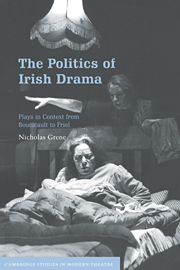Book contents
- Frontmatter
- Contents
- Acknowledgements
- Chronology
- List of abbreviations
- Introduction
- 1 Stage interpreters
- 2 Strangers in the house
- 3 Shifts in perspective
- 4 Class and space in O'Casey
- 5 Reactions to revolution
- 6 Living on
- 7 Versions of pastoral
- 8 Murphy's Ireland
- 9 Imagining the other
- Conclusion: a world elsewhere
- Notes
- Bibliography
- Index
4 - Class and space in O'Casey
Published online by Cambridge University Press: 22 September 2009
- Frontmatter
- Contents
- Acknowledgements
- Chronology
- List of abbreviations
- Introduction
- 1 Stage interpreters
- 2 Strangers in the house
- 3 Shifts in perspective
- 4 Class and space in O'Casey
- 5 Reactions to revolution
- 6 Living on
- 7 Versions of pastoral
- 8 Murphy's Ireland
- 9 Imagining the other
- Conclusion: a world elsewhere
- Notes
- Bibliography
- Index
Summary
D.J. O'Donoghue, writing two years after Synge's death, expressed a common nationalist viewpoint when he described how the plays reflected ‘an exotic and alien mind’. ‘I have never been able to regard Synge as one who, living amongst a people, grows to be one of them, identifies entirely with them, and voices their thoughts and emotions, and interprets their every movement.’ Synge remained the Anglo-Irish gentleman outsider, by his own admission forced for his knowledge of the people to eavesdrop on ‘what was being said by the servant girls in the kitchen’ (Synge, CW, iv, 53). With O'Casey's tenement plays it was different from the beginning. O'Casey was perceived as writing from within; he was praised for the immediacy, the authenticity and reality of his representation of slum life. The Shadow of the Gunman was ‘a gramophone record of the Dublin accent and the Dublin tenement and the Dublin poor’. ‘Mr O'Casey lived among the people he portrays, and he makes his audience live among them, too’, wrote the Irish Times reviewer of Juno and the Paycock. In The Plough and the Stars (which won admiring reviews before it hit trouble at its fourth performance), ‘It is as if the author had taken us by the hand and brought us down to this tenement … and told us to watch what was going on.’
- Type
- Chapter
- Information
- The Politics of Irish DramaPlays in Context from Boucicault to Friel, pp. 110 - 135Publisher: Cambridge University PressPrint publication year: 2000



